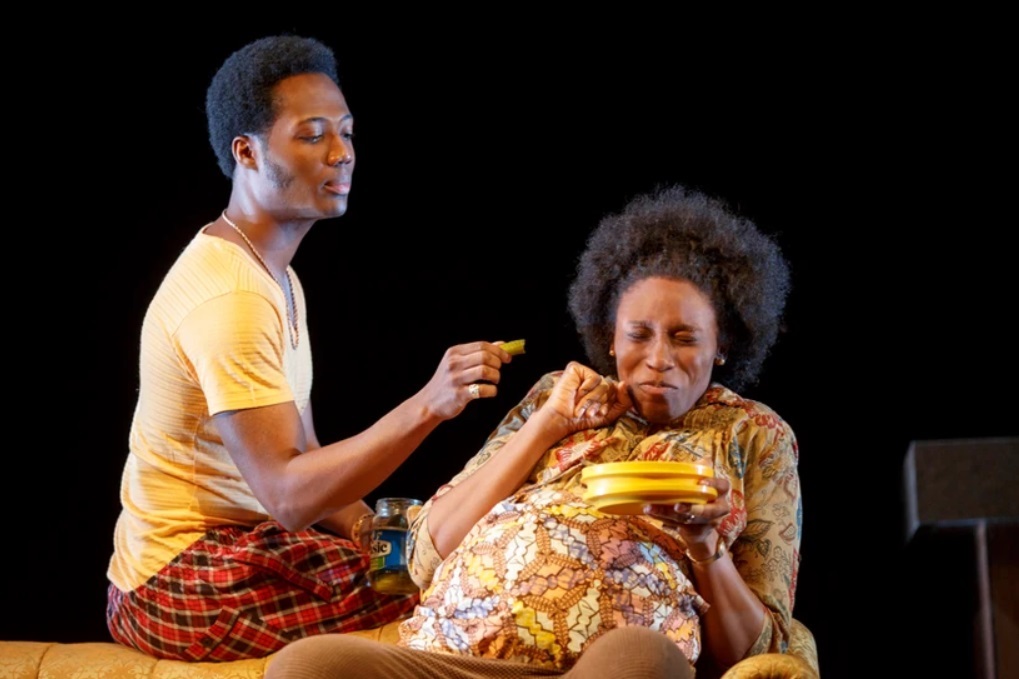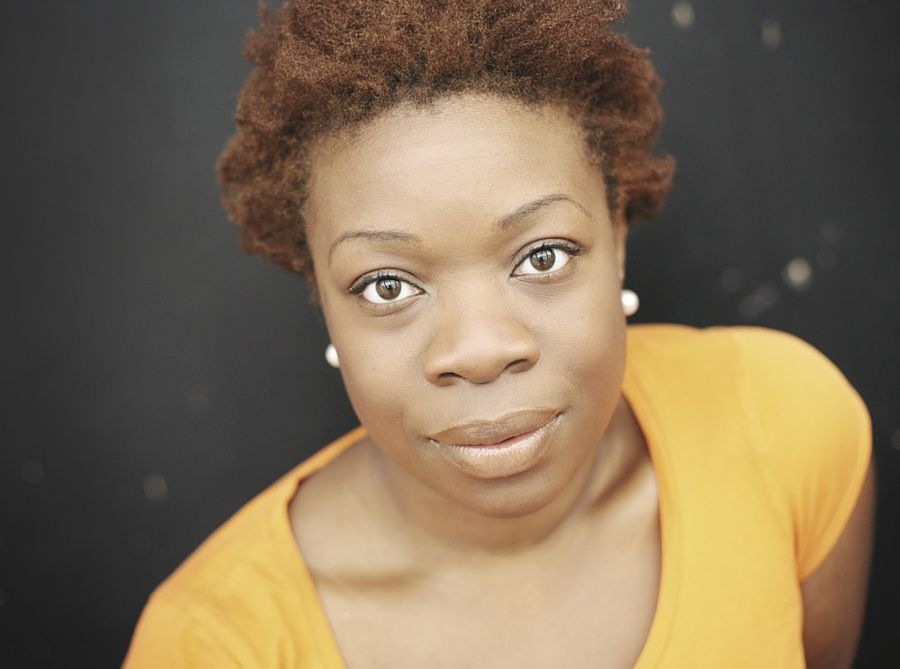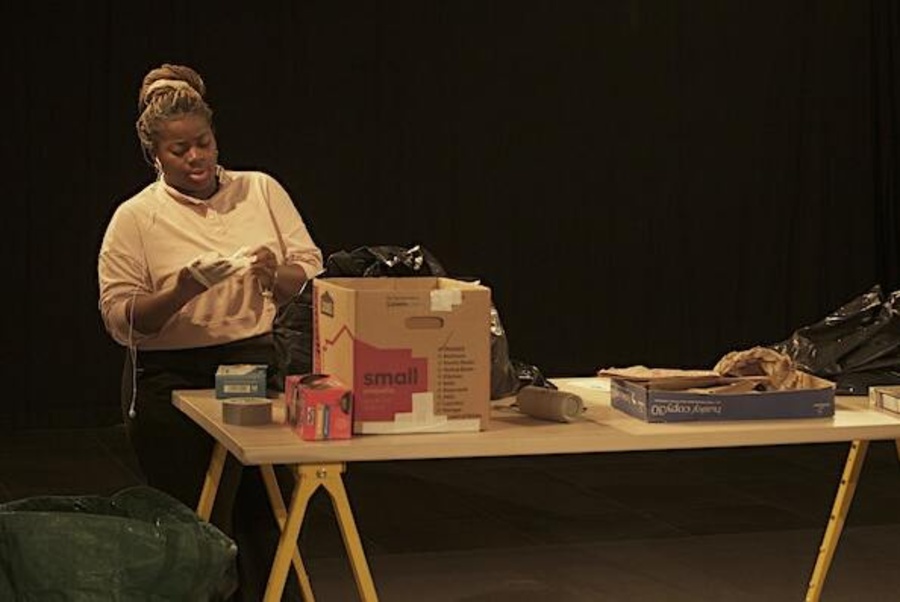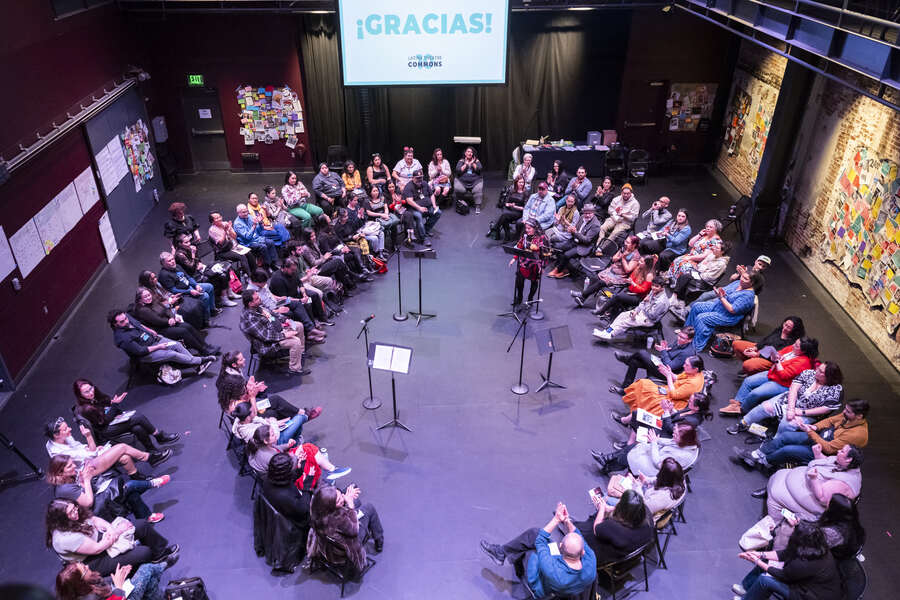Mfoniso Udofia has created something big. The celebrated writer, who has developed works for the stage as well as for the small screen (including 13 Reasons Why, Pachinko, A League of Their Own, Lessons in Chemistry), has been cooking up an ambitious project for more than a decade: the Ufot Family Cycle, a nine-play saga following a Nigerian family over three generations. We first wrote about the cycle in 2017, when she was in the midst of writing the sixth play, and two of the plays, Sojourners and Her Portamanteau, were running in rep at New York Theatre Workshop.
Now Boston will get to see the whole thing. Over the next two years, the Huntington Theatre, in partnership with universities, social organizations, nonprofits, and community activation partners, is hosting a city-wide festival during which all the plays—five of which have never been staged—will be produced.
First up in the cycle is Sojourners, at the Huntington from Oct. 31 through Dec. 1, directed by Dawn M. Simmons, co-founder, co-producer, and artistic director of the Front Porch Arts Collective. Sojourners introduces us to Abasiama and her husband Ukpong, who come to the U.S. from Nigeria in the 1970s for a good education, then plan to head back home after the Biafran War. As Ukpong digs deeper into the music of Motown and revels in the independence American culture provides, the couple’s goals begin to misalign.

Udofia has been writing these plays since approximately the summer of 2009, she said. She was inspired, at least in part, by a meeting with the late August Wilson at the Huntington. Wilson is of course famous for his American Century Cycle, which tells African American stories in each decade of the 20th century (which is rolling out in a similar years-long citywide festival in Baltimore-area theatres). The Ufot cycle is not an homage to Wilson per se, said Loretta Greco, artistic director at the Huntington. Still, Udofia’s endeavor does feel like a marching on of sorts in the centering of Blackness onstage, asserting, with each new offering, that the inclusion of these stories in the theatrical canon is as worthy and vital as any other.
Udofia said her particular interest is “the connection between Africa and her diasporas, specifically Black America.” Her body, she said, is “that intersection.” Udofia was born in the U.S. to parents from Nigeria. She grew up in Southbridge, Massachusetts, and attended Wellesley College, but instead of eating hamburgers at home, the menu included fufu, okra, afang soup, and her favorite, edikanikong (a hearty soup). That, and the language spoken inside her house, were secrets she mostly kept from the outside world. However, it was “not until I started proudly proclaiming the interiority of my house that I felt great.”
The question Udofia now thinks about when it comes to her work is, “How can there be diasporic healing, and how can we forge and find love without looking outside of the diaspora?” Given the “pretty acerbic” discourse that can arise between African immigrants and Black Americans during the rare opportunities that they’re depicted onstage or on TV together, she said, Udofia wanted to write something different.
“I am really interested in how we heal the rift between us that was caused by other entities and cannot be fixed by them,” she said.
In Sojourners, a friendship between matriarch Abasiama and an African American woman named Moxie promises a pathway, and later in the cycle other relationships among these groups arise. If diasporic healing is the throughline, each play in the cycle also considers and attempts to answer—or “unravel,” as Udofia put it—some existential question. For Sojourners, the question was, “Can the Nigerian dream operate or work within an American paradigm?” While penning The Grove, which follows Adiaha Ufot, the queer daughter of Abasiama and Disciple Ufot, Udofia wondered, “How do you self-individuate when you come from a collectivist culture?” (The Grove runs in a Huntington production at Calderwood Pavilion, Feb. 7-March 9, 2025). For runboyrun (in a radio-play/podcast staging at Boston Public Library next February and March), she asked, “When does trauma become tradition?”
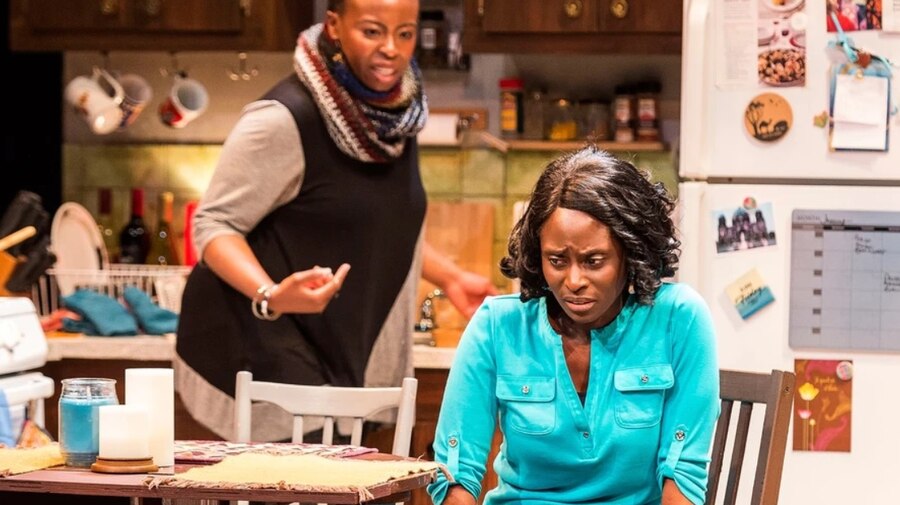
Whether the storyline or the question emerges first depends on the play, but it was the characters themselves who pushed Udofia to draft the cycle in its entirety. Sometimes as she was developing one story, she recounted, another character would pop up and attempt to take over. So she decided to keep going and allow space for the other characters to share their perspectives. She capped it at nine so she’d have a finish line.
The plays in the cycle tackle challenges the Ufot family faces: love, divorce, identity, immigration, culture, friendships, disconnection. Sojourners and three others—runboyrun, Her Portmanteau (at Central Square Theater in a co-production with Front Porch Arts Collective, March 27-April 20, 2025), and In Old Age (slated for spring 2026, in a co-production between ArtsEmerson and Front Porch)—have been staged previously, but five will be premieres. These include the aforementioned The Grove as well as Kufre n’ Quay at the Boston Arts Academy (in collaboration with Wheelock Family Theatre) in summer 2025; The Ceremony, slated for a co-production between Boston Playwrights’ Theatre and Boston University College of Fine Arts in fall 2025; Lifted, at Wellesley Repertory Theatre in winter 2026; Adiaha and Clora Snatch Joy (a folk opera), which will be co-staged by Boston Lyric Opera and the Huntington in summer 2026.
In addition to the questions that might guide a story, Udofia leans heavily on research to create the script. The third play in the cycle is about the Biafran War, a civil war between Nigeria and the Republic of Biafra that raged between 1967 and 1970. It was critical for Udofia to understand more about it, and then “disappear it somehow into the setting and circumstance of Sojourners,” Udofia explained.
She also wanted to understand more about Cross River, a state in Nigeria. Her people, she said, were “part of the chunk that broke off when Cross River became two states, Cross River and Akwa Ibom.”

Understanding the land and the economic realities of people’s lives was important, but perhaps most significant was homing in on the “sojourner” dream—i.e., leaving with the idea of coming back, with all the potential and hope in both directions. “All of that research is in the mouths of people in different ways,” Udofia said.
The art of providing context without it turning into a lecture is also augmented by dramaturgy. Christine Mok, the dramaturg for Sojourners, said she also starts with historical research, with “a focus on product versus process.” When approaching a project, Mok said, she helps to shape a show in three ways: talking to the playwright to find out their priorities; creating the actor’s packet (a digital repository, which in this case might include ways to talk about postpartum depression and dyslexia before there was medical language for it); and curating and writing pieces for the show’s large, magazine-style program.
Added Mok, when dramaturgy is at its best, you won’t notice it. “It’s seamless,” she said.
For all the work that has already gone into the Boston-wide staging of the Ufot cycle, there’s much more to do. Greco, the Huntington’s artistic director, and numerous partners want to ensure audiences in Boston’s neighborhoods and beyond have access to the shows. It’s a massive undertaking, but Greco is undaunted.
“One of my aspirations for the new era here at the Huntington,” Greco said, is to “take on the big, big stories that are asking the big questions of what it is to be alive today and to not shy away or try and shrink our vision down. The way to thriving is by pursuing these epic stories.”

The other aspiration is for the Huntington to integrate their work onstage with their community classroom work, “while still making sure the artistic excellence is robust, and that we are also leaning in and elevating our role as a public good,” Greco said.
Coordinating with so many partners might sound like an uphill battle. Still, cocktail parties, conversations, and convenings in homes and in the theatre about this effort over the last few years have proved fruitful, and Greco has found people to be open and welcoming to the idea. Since the plan’s inception, the Huntington has forged liaisons with dozens of partners, including the Boston Foundation, GBH, Front Porch Arts Collective, and others to make sure that ticket prices aren’t a barrier to access, that there will be an affordable nine-play pass, and that the free pop-ups in different communities, such East Boston, Roxbury and Hyde Park, make a concerted effort to reach targeted audiences.
One early example of community outreach was a meet-and-greet with the cast and creative team at the start of October at the Huntington. The audience got a sneak peek at the costume and set design concepts, heard from partners, and had the chance to listen to a reading of Sojourners, rich with Ibibio language. The event, during which the audience filed into the Maso Studio, offered an insightful pulling back of the curtain. The din of conversation filled the room as people embraced and laughed, then quieted for the reading. The camaraderie, even among strangers, was refreshing.
Perhaps that’s due to Greco and Udofia’s 12-year-long connection. Greco has produced three of Udofia’s premieres and is an admirer of her work. When deciding what to take on, Greco said she chases stories that excite her. She also wants to bring stories to the stage “that are going to stretch us so that we leave the theatre more compassionate, having walked in someone else’s shoes.”
This cycle, both Udofia and Greco agree, tells a different kind of immigrant story than one we may be used to seeing: about people who come to the U.S. with plans to get an education, then go home to better their country.
“One of the things I think it accomplishes,” Greco said, is it “talks about the glory and the price of straddling two cultures. Sometimes, there’s an elegance to that, and sometimes there are breaking points to that. And what it is to carry one’s legacy into the future…can look like a lot of different things.”
Producing this cycle hand in hand with others exemplifies the community engagement Greco has been most excited about since she became the artistic director at the Huntington in 2022. Greco has a long history in the theatre, including having run San Francisco’s legendary Magic Theatre, and in fact Udofia’s nine-play saga was an idea she brought up while being interviewed for her current position.
It’s early in the process, and there are still partners to bring on. But so far, collaborating to bring the Ufot cycle to fruition seems to be going smoothly, and hopefully it helps combat the silos that can arise in the theatre.
Theatre is for the people, Udofia said when talking about how noteworthy the coming together of community activation partners has been for this project. Summing up the motivation of the partners in this ambitious citywide undertaking, the playwright said, “Where the people are, you go.”
Jacquinn Sinclair is a Boston-area-based journalist, author, and poet. Currently, she’s a contributing performing arts writer and theatre critic for WBUR’s The ARTery.
Support American Theatre: a just and thriving theatre ecology begins with information for all. Please join us in this mission by joining TCG, which entitles you to copies of our quarterly print magazine and helps support a long legacy of quality nonprofit arts journalism.

